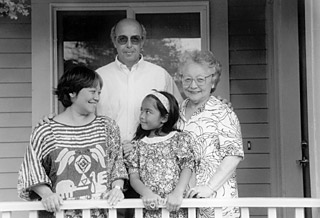When my daughter was born, the biggest thing I noticed was that the daily details of my life were suddenly more like my childhood than like the years of adulthood. I was 39 when I became a parent. Since leaving home at 18, I had created a life for myself rich in friendships, networks, political work, and complex experience. I knew tons of people, went to lots of parties and events, and felt very grounded in community. And then I gave birth. And the kind of individual flexibility I had—such as showing up at parties and meetings in the early mornings or late at night—shifted. And so did my community.
This was not a harmful thing, not a change based on unkindness or shunning, just one based on access. My piece of the jigsaw puzzle no longer fit. And in feeling that awkwardness, I noticed something. I noticed that as an adult, most of the work I had done and the community I had built depended on individual choice. I showed up at events, at political moments, at friend’s sickbeds, because I chose to show up. I didn’t show up when I chose not to. This was the choice, and the privilege, of an able-bodied adult who could physically leave my home and hop on a bus or a bike to get where I wanted to go when I wanted to without needing to negotiate access or transportation. This was about class and economic privilege and specifically the resource of time. I wasn’t working three jobs or working shifts that prevented me from being part of mainstream time patterns.
When my daughter, Luca, was born, her needs for sleep and food and quiet time, and their effect on my energy and attention, shifted how I could show up in community. I was still able-bodied. I had only one child. I had a stable partnership so I was not alone as a single parent and even with all of this, I was struck by how different my choices were—and how much my choices previously had been directly connected to what I wanted or needed as an individual. Meaning, if I didn’t feel well, I didn’t show up. If I was tired and had been working a lot, I didn’t show up. When I didn’t like some of the people, I didn’t show up. When I just plain wasn’t in the mood, I didn’t show up. Or with all of these things, I had that option and I used it. Sometimes I came and sometimes I didn’t. This is the freedom of able-bodied adults with access to disposable time and disposable income, even small amounts of each.
What I noticed was that, as a child, I had lived in communities that didn’t have choice as their central doctrine. When my family was in a car accident when I was seven that killed my father, my brother, and a cousin, and then put my mother’s body into a range of dependent health care situations, people showed up. They showed up despite the family dynamics of who liked each other and who didn’t. They showed up even though many of them missed work, job opportunities and potential relationships. They showed up even though some of them were angry, believing that the death of their child, my cousin, resulted from the actions of my family, the drivers.
I believe in community that includes a deep responsibility to each other—no matter who we are. Truthfully, this is what I think about when I hear words like “family” and “community” and “local:” dealing with people we don’t like as well as the people who are just easy to be around. That’s been one of the differences in how a lot of us use words like “family” and “community.” Family in a daily way means dealing with the uncle who never washes dishes or cleans up at family gatherings, the neighbor who thinks Barry Manilow is god and plays his music loud enough for the dogs to howl, and the sister who believes that God and guns bring social justice. Barring violence and intense trauma, we don’t “leave” our families. We might not always like them or feel like we’re cut from the same cloth, but they’re still our families. “Family” is the word we queer people use when we refer to those we have chosen, the people we can call at 3:00 a.m. because there is a bat flying around in our bedroom as well as the people who stay there as we go through a break-up, remembering to tell us we are beautiful or fabulous or need to stop the whole serial-monogamy thing. Hopefully, we use “family” to refer to the people we show up for, no matter what, and who show up for us. And when we choose this family, we choose them for the hard as well as the easy. Living with the uncomfortable as well as the comfortable, showing up for people even when it isn’t easy, is one of the gifts of having a family. It is a gift that I want to use to build a movement for social justice. It’s how I want to build community. I am not always good at it, but I am practicing.
Showing up for people means a lot of different things: understanding the social context of our lives and the myriad struggles and celebrations of who we are, having an analysis about the ways in which our bodies are affected by history and institution, all of these things count as showing up. But they’re only part of it. I remember standing on a park corner about ten years ago. I had run into a friend, an organizer doing powerful and groundbreaking work in my community on the places where immigration and sexuality come together. This friend was looking tired. Tired and depressed. In the course of talking, she shared that her mother has been struggling her entire life with mental illness. This struggle was about to result in her mother losing her home. My friend’s family comes from an immigrant community and a culture without a large presence in the Twin Cities. There is no form of “our people” to draw from. My friend talked about how she was going to have to pull out of work to care for her mother. I asked her to call on me, said I would help in any way I could, asked if I could organize a group of friends to support her family as they worked through this. She was very kind but kept saying no, but thank you, and no again. Stubbornly I pushed back, reading her response as being a kind of shyness; through my cultural lens it looked like she believed she had to deal with this alone. Finally she looked at me and said very directly, “Seriously, Susan, what are you going to do? Have us live with you? Raise us as your own? You don’t speak the same language as my mother, hardly anyone here does. She needs constant supervision and you have your own family. Are you going to adopt us?”
My friend was part of a large queer community and an immigrant rights community. She was well-loved and supported in the ways we showed support. People went to the rallies she organized, they read her work, they networked and shared information, and held each other accountable. She was always invited to be a part of the creative moments where new and exciting thinking and programs took place. And she was right, there was not a lot that was set up to hold and support her family in the long term, short of merging our homes. No matter how much some of us helped with the groceries now and again, showed up to clean her house or to drive her mother to an appointment, my friend would have to leave the life she had built or ignore her mother’s struggle. That was the choice she had to make.
Any kind of organizing, queer and otherwise, without a commitment to the practicalities of economic justice is organizing around privilege. Period. Economic justice demands that we all have a safe place to live, enough food to eat that is healthy, a way to get well when we are sick, and clothes to wear when we are cold. More than that, the basic needs that enable us to be well and thriving include safety and a sense of belonging. When these are in place, we are better able to meet the sadnesses and struggles as well as the joys and opportunities that are a regular part of day-to-day living. Hell, life is just plain easier. Without them, we are too focused on survival to talk about revolution. And social change that does not include the most vulnerable among us is not social change. It is status quo.
Class-based organizing is concerned with how we show up for ourselves and others in the day-to-day infrastructure of our lives, the math of how much it costs to pay for our life, what happens when are sick and whether or not the dollars and support are accessible. Right now we live in a time when large parts of this infrastructure—like health care and a living wage and good healthy food—are dependent on how much money we have raised or inherited in our individual families. In other words, the rich do better than the poor. Most of the time, this is not seen as being a queer conversation. It’s not understood as essential to being queer, as part of the wholeness of queer lives.
Do you know how radical it is when we mix queerness and economic justice? The gorgeous ways we bring our honest and collective basic needs together with how we claim our bodies, our desire, our gender, our poetry, our performance? This provides the shared and stable foundation which fully lets us soar—loudly and proudly.



